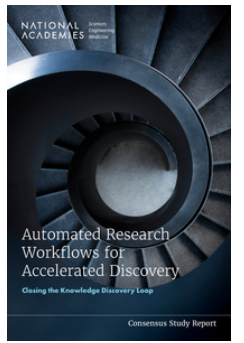Atkins chairs National Academies report on speeding discovery with automated research workflows

A new report chaired by founding dean of the University of Michigan School of Information and professor emeritus of EECS and Information Daniel Atkins III shows that artificial intelligence (AI) and automated research workflow technologies (ARWs) can help propel research and scientific discoveries into new territories at an accelerated pace.
The report, “Automated Research Workflows for Accelerated Discovery: Closing the Knowledge Discovery Loop,” was recently published by the National Academies of Sciences, Engineering, and Medicine. Committee members include an international cohort of scholars from universities, government, and research organizations.
“Realizing the potential of ARWs is a complex mix of technology, funding, policy, regulation, ethics, education, reward structures, and the overall sociology of varied research communities of practice,” writes Atkins.
ARWs are being used to design and conduct experiments, analyze data and observe natural phenomena. Realizing the potential of ARWs could accelerate the pace of scientific discovery by orders of magnitude, thereby expanding the research enterprise’s contribution to society, the report says.
For example, research groups in materials science are building systems where ARWs cut the time required for synthesis and testing of materials from nine months to five days. In drug discovery research, an active learning algorithm identified 57 percent of the active compounds by performing just 2.5 percent of the possible experiments, compared with 20 percent identified through a traditional approach of building a model for each target.
In addition to increasing the speed and efficiency of research, ARWs can create greater transparency and repeatability by automating and capturing specific steps in the research process. In turn, this can foster reproducibility, replicability, and trust in research, the report says.

“One of the aspects I want to emphasize is that automated workflows can ensure integrity of AI-driven science,” says Alfred Hero, J. R. Jamison and Betty Williams professor of Engineering at U-M, and committee member on the report. “I think we’re at the beginning of a revolution in science if ARWs that can monitor the analysis of data can be incorporated into the full cycle of discovery.”
The committee members recommend that research funders, including stakeholders like scientific societies, research institutions, and publishers, place greater priority on approaches to ensuring the creation and sustainability of key systems, tools, platforms, and data archives for ARWs.
They also identify design principles that ARWs should embody, such as facilitating openness and transparency, following the principles of responsible AI and machine learning, and prioritizing the reuse and sustainability of existing tools when possible and appropriate.
Legal and policy issues will affect implementation of automated research workflows in specific domains, and will require international multi-stakeholder efforts to address them, the report says. For example, ARWs will need to be designed to comply with institutional policies and government regulations intended to protect personal data privacy, and to provide transparency in results from data use.
Research funders, higher education and research institutions, and scientific and professional societies should support the development and implementation of educational programs and career pathways aimed at building the workforce needed to develop and utilize ARWs.
The study by the Committee on Realizing Opportunities for Advanced and Automated Workflows in Scientific Research was sponsored by Schmidt Futures.
The National Academies of Sciences, Engineering, and Medicine are private, nonprofit institutions that provide independent, objective analysis and advice to the nation to solve complex problems and inform public policy decisions related to science, technology, and medicine. They operate under an 1863 congressional charter to the National Academy of Sciences, signed by President Lincoln.
Daniel Atkins is emeritus W.K. Kellogg professor of information and emeritus professor of electrical engineering and computer science. He is an elected member of the National Academy of Engineering. He was the founding dean of the School of Information, served as the dean of the College of Engineering, and was the associate vice president for research at U-M. Atkins was the inaugural director of the Office of Cyberinfrastructure at the National Science Foundation (NSF), and he chaired the Blue Ribbon Panel on Research Cyberinfrastructure for NSF that became an international roadmap for initiatives on cyber-enabled research in the digital age. He has chaired or served on many advisory boards for government, academia, philanthropy, and industry.
News story by Sara Frueh, NAS senior media officer and Sarah Derouin, UMSI public relations specialist.

Automated Research Workflows Are Speeding Pace of Scientific Discovery; New Report Offers Recommendations to Advance Their Development, News Release, National Academies
 MENU
MENU 
